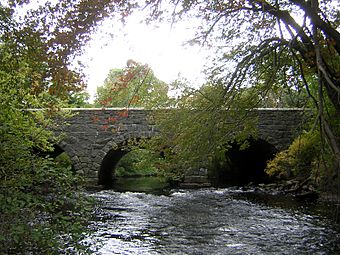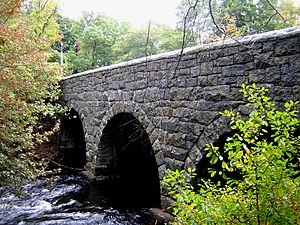Paul's Bridge facts for kids
|
Paul's Bridge
|
|
|
U.S. Historic district
Contributing property |
|

North side
|
|
| Location | Milton and Boston, Massachusetts |
|---|---|
| Area | less than one acre |
| Built | 1849 |
| Part of | Neponset Valley Parkway (ID04001573) |
| NRHP reference No. | 72000140 |
Quick facts for kids Significant dates |
|
| Added to NRHP | December 11, 1972 |
| Designated CP | January 24, 2005 |
Paul's Bridge is a historic stone bridge in Massachusetts. It carries the Neponset Valley Parkway over the Neponset River. This bridge connects the towns of Milton and southern Boston, Massachusetts.
The bridge was first built in 1849 by Thomas Hollis, Jr. of Milton. It was later rebuilt using many of its original stones. Before this bridge, there was an older one called Hubbard's Bridge. Then, in 1807, a bridge named Paul's Bridge was built in its place. The current bridge is about 88 feet (27 meters) long. The name "Paul" comes from Samuel Paul, who owned land nearby. His land was on the Readville side, which is now part of Boston.
Contents
Paul's Bridge: A Historic Crossing
Paul's Bridge is an important part of local history. It helps people travel between Milton and Boston. The bridge shows how engineering and construction have changed over time. It's a great example of old stone bridges.
Building the Original Bridge
The Paul's Bridge you see today was built in 1849. It was 81 feet (25 meters) long and 22 feet (6.7 meters) wide. The bridge was made from strong Quincy granite stones. These stones were put together without mortar, which is like a special glue for stones.
How the Bridge Was Built
The bridge has round arches, each about 20 feet (6.1 meters) wide. The stones that form these arches are called voussoirs. They are carefully cut to fit together perfectly. The spaces between the arches were filled with rough, uneven stones. This type of stone work is called "rubblestone."
A New Look for the Bridge
Paul's Bridge went through a big rebuilding project. This happened between 1932 and 1935. Arthur A. Shurcliff, a famous landscape architect, led the project. His main goal was to make the bridge wider.
Modernizing the Bridge
During the rebuilding, most of the original stones were used again. The old wooden side rails were replaced with solid stone walls. These new walls are called parapets. On the widened parts of the bridge, the stones between the arches were laid in neat rows. This is different from the original rough rubblestone.
Protecting History
Paul's Bridge is recognized as an important historical site. It was added to the National Register of Historic Places in 1972. This means it's a special place worth preserving.
Part of a Larger Historic Area
The bridge is also part of a larger historic district. This district includes the Neponset River Parkway. Paul's Bridge is located within the Neponset River Reservation. The Massachusetts Department of Conservation and Recreation takes care of the bridge today.
 | Shirley Ann Jackson |
 | Garett Morgan |
 | J. Ernest Wilkins Jr. |
 | Elijah McCoy |




